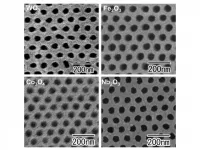Doctor communication key to pandemic vaccine adoption
2021-03-15
(Press-News.org) PULLMAN, Wash. - People who talk with their doctors are more likely to get vaccinated during a pandemic, according to a study of evidence collected during the "swine flu," the last pandemic to hit the U.S. before COVID-19.
Researchers from Washington State University and University of Wisconsin-Madison surveyed patients about the vaccine for the H1N1 virus, also known as the swine flu, which was declared a pandemic by the World Health Organization in 2009. They found that doctor-patient communication helped build trust in physicians, which led to more positive attitudes toward the H1N1 vaccine--and it was more than just talk; it correlated to people actually getting vaccinated.
The study, recently published in the journal Health Communication, builds on previous research showing doctors can curb negative attitudes toward vaccinations in general, but this study specifically focuses on that role during a pandemic.
"A vaccine during a pandemic is definitely different from others, like the flu vaccine, which people already know about," said Porismita Borah, an associate professor in WSU's Murrow College of Communication and lead author on the study. "During a pandemic, it is a new vaccine for everybody. People may have more hesitancy and may be more worried about side effects. The doctor's office is one of the best sources of information for patients who have questions."
The researchers analyzed survey responses from more than 19,000 people nationwide on their attitudes toward doctors and their willingness to discuss vaccines with their physician as well as their willingness to get vaccinations--and ultimately whether or not they got the H1N1 vaccine. They found that the willingness to talk to doctors about the issue correlated with increased trust and receiving the vaccination.
The authors note that doctors often feel that they cannot ethically tell patients to take a certain vaccine. Instead they recommend physicians simply act as a resource, helping answer questions so patients can make better informed decisions. They do not, however, need to wait until patients come to them.
"Doctors could voluntarily reach out to patients, even by email, to let them know what the COVID-19 vaccine means," said Borah. "They can answer questions like how was the vaccine made? What should patients expect? Why are there two doses? I think there might be many questions people have which can be easily answered by primary care physicians who are usually well trusted by the general public."
Doctor communication with patients is particularly pressing now, Borah added, given that that one in five Americans showed an unwillingness to get the COVID-19 vaccine and the amount of misinformation around the pandemic.
"People have to be really careful about what they're seeing and what they're reading because there is so much misinformation circulating on social media," said Borah. "Sometimes this misinformation is circulated by friends and family members without any sort of bad intention--they just share it, so it's extremely important to get information from trusted sources."
INFORMATION:
ELSE PRESS RELEASES FROM THIS DATE:
2021-03-15
(COLUMBUS, Ohio) - High-powered magnets are small, shiny magnets made from powerful rare earth metals. Since they started showing up in children's toys in the early 2000s and then later in desk sets in 2009, high-powered magnets have caused thousands of injuries and are considered to be among the most dangerous ingestion hazards in children.
When more than one is swallowed, these high-powered magnets attract to each other across tissue, cutting off blood supply to the bowel and causing obstructions, tissue necrosis, sepsis and even death. The U.S. Consumer Product Safety Commission (CPSC) found them dangerous enough that in 2012 they halted the sale of high-powered magnet sets and instituted a recall followed by a federal rule that ...
2021-03-15
A fear of poor SATs results is driving headteachers to separate pupils by ability despite the impact on children's self-esteem and confidence, according to a study by researchers from UCL published in the peer-reviewed British Journal of Sociology of Education.
The findings, based on a survey of nearly 300 principals of primary schools in England, provide new evidence of a high-stakes culture around testing where some pupils are prioritised above others and physically segregated from them.
More than a third (35%) of headteachers said SATs were the reason for grouping children into different ability sets for English, and just under half (47%) for maths, according to the results which also ...
2021-03-14
In the world of neurodevelopment, one thing is clear: the earlier the intervention the better. Infancy is a critical time in brain development, and neuroscientists are increasingly identifying factors that can negatively impact cognition and ones that can improve cognition early in life. At the annual meeting of the Cognitive Neuroscience Society (CNS), researchers from the University of Minnesota are presenting new work on two early interventions: one on the potential use of engineered gut microbes for antibiotic-exposed infants and another on a choline supplement to treat infants exposed prenatally to alcohol.
"These talks underscore how patient-based neuroscience can advance ...
2021-03-13
Men experiencing vital exhaustion are more likely to have a heart attack, according to research presented today at ESC Acute CardioVascular Care 2021, an online scientific congress of the European Society of Cardiology (ESC).1 The risk of a myocardial infarction linked with exhaustion was particularly pronounced in never married, divorced and widowed men.
"Vital exhaustion refers to excessive fatigue, feelings of demoralisation and increased irritability," said study author Dr. Dmitriy Panov of the Institute of Cytology and Genetics, Novosibirsk, Russian Federation. "It is thought to be a response to intractable problems in people's lives, particularly when they are unable to adapt to prolonged ...
2021-03-13
Tokyo, Japan - Scientists from Tokyo Metropolitan University have developed a new method for making ordered arrays of nanoholes in metallic oxide thin films using a range of transition metals. The team used a template to pre-pattern metallic surfaces with an ordered array of dimples before applying electrochemistry to selectively grow an oxide layer with holes. The process makes a wider selection of ordered transition metal nanohole arrays available for new catalysis, filtration, and sensing applications.
A key challenge of nanotechnology is getting control over the structure of materials at the nanoscale. In the search for materials that are porous at this length scale, the field of electrochemistry offers a particularly elegant ...
2021-03-13
MRI scanning can more precisely define and detect head, neck, thoracic, abdominal and spinal malformations in unborn babies, finds a large multidisciplinary study led by King's College London with Evelina London Children's Hospital, Great Ormond Street Hospital and UCL.
In the study, published today in Lancet Child and Adolescent Health, the team of researchers and clinicians demonstrate the ways that MRI scanning can show malformations in great detail, including their effect on surrounding structures. Importantly, they note that MRI is a very safe procedure for pregnant women and their babies.
They say the work is invaluable both to clinicians caring for babies before they are born and for teams planning care of the baby after delivery.
Recent research has concentrated ...
2021-03-12
The Affordable Care Act (ACA) dramatically increased children's preventive healthcare while reducing out-of-pocket costs, according to a new Boston University School of Public Health (BUSPH) study.
Published in JAMA Network Open, the study found that checkups with out-of-pocket costs dropped from 54.2% of visits in 2010 (the year the ACA passed) to 14.5% in 2018.
"This is a great feather in the cap of the ACA, even though there is still some work to do," says study lead author Dr. Paul Shafer, assistant professor of health law, policy & management at BUSPH.
"We found ...
2021-03-12
MIAMI--A new study lead by scientists at the University of Miami (UM) Rosenstiel School of Marine and Atmospheric Science demonstrates that under realistic environmental conditions oil drifting in the ocean after the DWH oil spill photooxidized into persistent compounds within hours to days, instead over long periods of time as was thought during the 2010 Deepwater Horizon oil spill. This is the first model results to support the new paradigm of photooxidation that emerged from laboratory research.
After an oil spill, oil droplets on the ocean surface ...
2021-03-12
Cancer cells can dodge chemotherapy by entering a state that bears similarity to certain kinds of senescence, a type of "active hibernation" that enables them to weather the stress induced by aggressive treatments aimed at destroying them, according to a new study by scientists at Weill Cornell Medicine. These findings have implications for developing new drug combinations that could block senescence and make chemotherapy more effective.
In a study published Jan. 26 in Cancer Discovery, a journal of the American Association for Cancer Research, the investigators reported that this biologic process could help explain why cancers so often recur after treatment. The research was done in both organoids and mouse models ...
2021-03-12
A study of the relationship between temperature and yields of various rice varieties, based on 50 years of weather and rice-yield data from farms in the Philippines, suggests that warming temperatures negatively affect rice yields.
Recent varieties of rice, bred for environmental stresses like heat, showed better yields than both traditional rice varieties and modern varieties of rice that were not specifically bred to withstand warmer temperatures. But the study found that warming adversely affected crop yields even for those varieties best suited to the heat. Overall, the advantage of varieties bred to withstand increased heat was too small to be statistically significant.
One of ...
LAST 30 PRESS RELEASES:
[Press-News.org] Doctor communication key to pandemic vaccine adoption

